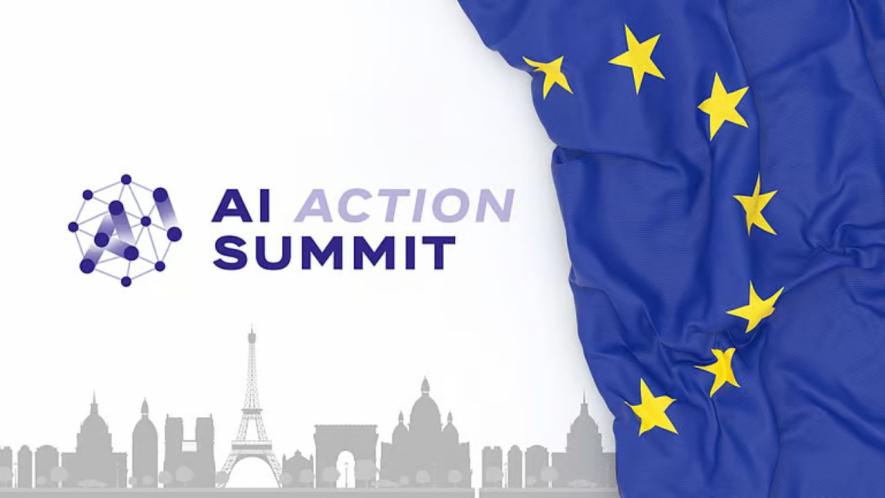At Paris AI Action Summit, All Eyes Must be on EU

On February 2, 2025, the first set of rules under the Artificial Intelligence Act (‘AI Act’), which came into force on August 1, 2024, came into force. Some notable implications of these rules include a prohibition on the use of AI programmes that evaluate social behaviour, and a partial restriction on facial recognition in public spaces. With the AI Act, the European Union has set yet another example regarding how liberal democracies could be cognizant regarding their responsibility towards providing citizens certain implicit reservations of digital rights and their enforceability without demand. Previously, the General Data Protection Regulation (‘GDPR’) had stood ground as a model in this regard, in a changing, highly connected world.
“Data is a new currency,” “Data is a new corporate raw material,” and “Data is the most valuable thing on earth” – these are no longer prognoses. Data is a new war. It is not unlikely that in the near future, political parties across electoral constituencies would pitch data protection as a crucial agenda within their manifestos. This will be guided by two core objectives - self-preservation, and the positioning of data protection as ‘national interest’, even as the latter will likely be guided by the standing of corporate lobbies on the issue.
The European Union's AI Act is a pioneering effort to regulate artificial intelligence, categorizing AI systems based on risk levels and setting a global precedent for ethical AI governance.
Until July 2017, when Alphabay, Thailand’s largest Dark Net marketplace, was busted for distributing fake licenses, cocaine, guns and similar prohibited goods, the country had not felt the need to intervene into personal data policy.
Cybercriminals often choose jurisdictions where it is hard to track them, and the governments in jurisdictions that lack a legal framework to intervene on personal data are often complicit. As for Thailand, officials claimed that they were uninformed about what was happening on Alphabay until they received communication from the Federal Bureau of Investigations. Naturally, the push for a global movement to legislate on the digital space would have to come from honest bureaucratic engagements which are, at least to some extent, divorced from private interests, and guided by a principled conscience. This uninfluenced, principled consensus is what should drive conversations and discussions around security and inclusivity at the upcoming AI Action Summit in Paris, scheduled to take place on February 10 and 11.
Examining European Union’s new AI Act
EU’s AI Act is a pioneering effort at establishing a comprehensive regulatory framework around AI. Introduced by the European Commission on April 21, 2021, the Act aims to ensure that AI systems are developed and utilized to uphold fundamental rights and “European values”.
It seeks to create a uniform legal framework for AI across countries in the EU, promoting innovation while safeguarding public interests. It addresses various stakeholders, including developers, providers, and users of AI systems, and applies to both the public and private sectors. The regulation's primary objectives are firstly, to ensure that AI systems in the EU market as safe and compliant with fundamental rights and EU values, secondly, to facilitate the development of a single market for lawful, safe, and trustworthy AI applications, and thirdly, to enhance the legal certainty to foster investment and innovation in AI.
An important feature of the Act is its risk-based classification approach, categorizing AI systems into four levels of risk:
-
Unacceptable Risk: AI systems deemed a threat to safety or fundamental rights are prohibited.
-
High Risk: AI systems that significantly affect individuals' rights or safety.
-
Limited Risk: AI systems with specific transparency obligations.
-
Minimal or No Risk: The proposed regulation does not intervene here, as these systems represent minimal or no risk to citizens' rights or safety.
The initial requirements, including prohibitions on certain high-risk AI practices, were enacted on February 2, 2025.
With the AI Act, the EU is reinforcing its stance on digital rights, prohibiting AI-driven social scoring and partially restricting facial recognition in public spaces.
The European Commission is also developing guidance to assist organizations in aligning with the Act's requirements. This includes clarifying obligations for high-risk AI systems and establishing procedures for incident reporting. The Commission has also initiated the AI Pact, a framework to help AI providers and users comply with key obligations before mandatory enforcement dates.
Non-EU entities offering AI solutions within the EU must adhere to the Act's provisions, impacting international AI development and deployment practices. This extraterritorial reach underscores the EU's ambition to lead ethical AI governance at a global stage.
The AI Act proposes establishing a European Artificial Intelligence Board to facilitate the legislation's implementation and drive the development of harmonized standards for AI. It also outlines substantial penalties for non-compliance.
The Act has been adopted and implemented across EU Member States. The European Commission continues to develop guidance and secondary legislations to support its application. The Act represents a significant step in the EU's digital strategy, aiming to balance technological innovation with protecting fundamental rights and public interests.
Here’s what to expect at the Paris AI Action Summit
Prime Minister Narendra Modi will co-chair the AI Action Summit alongside the French President Emmanual Macron. Earlier editions of the AI summit were held in the United Kingdom in November 2023 and South Korea in May 2024.
This Summit will be attended by Heads of State, leaders of international organizations, CEOs of small and large companies, academics, non-governmental organizations, artists, and civil society members. French officials said nearly 100 countries and over 1,000 private sector and civil society representatives worldwide will be represented to make this summit as inclusive as possible.
OpenAI chief executive Sam Altman, Anthropic CEO Dario Amodei, and MistralAI boss Arthur Mensch are among the industry heavyweights expected to attend the summit. Demis Hassabis, a chemistry Nobel winner who heads Google's DeepMind AI subsidiary, and economists like Nobel laureate Daron Acemoglu are also likely to visit, as are business leaders from German AI startup Aleph Alpha, Accenture, Mozilla, and Signal.
This summit will focus on five “main pillars” forming the basis of the preparatory work. The first is “AI in the service of the general interest,” the second is “the integration of artificial intelligence is transforming labor markets, job content, tasks and ways of working,” the third is “boost technological excellence in the service of innovation and artistic creation,” and the fourth is “trusted artificial intelligence.” Finally, the fifth is “global governance of AI.”
The Paris Summit aims to define a “common ground for international AI governance” amid a “major risk of fragmentation.”
The Paris AI Action Summit will bring together global leaders, industry pioneers, and policymakers to shape the future of AI governance, with India actively participating in the discussions.
Where does India stand on the AI Action Summit?
While addressing the media about PM Modi's participation in the AI Action Summit, the official spokesperson of the Ministry of External Affairs, Randhir Jaiswal, stated that India is also developing its own AI program.,
"We have our program, and we want to develop that further, and in that regard, we are in touch with several of our partners with whom we engage on technology issues and collaboration, and we would like to strengthen them further.".
The Minister of Information and Broadcasting Ashwini Vaishnaw said the government will host Open-Source models like DeepSeek on Indian servers soon. "We are going to do this very soon,” he remarked,“The team has already determined the following: How many servers are required? How much capacity is required? All those details have been worked out. We will very soon be hosting those open-source models on Indian servers."
This development comes after the emergence of Chinese AI DeepSeek, which has demonstrated that large-scale AI models can be developed without extensive access to graphics processing units.
All eyes on EU at the Action Summit
The European Union's proactive stance in regulating data protection and artificial intelligence highlights its dedication to safeguarding individual rights in the digital era.
The GDPR has set a global benchmark for data privacy. Building upon this foundation, the AI Act aims to ensure that AI technologies are developed and deployed responsibly, aligning with ethical standards and mitigating potential risks.
As technology evolves, the EU's comprehensive regulatory frameworks serve as exemplars for nations worldwide, highlighting the importance of balancing innovation with protecting fundamental human rights.
The upcoming Paris AI Action Summit presents a pivotal opportunity for global leaders to collaborate and learn from the EU’s commitment to Data Protection and Artificial Intelligence, ensuring that the digital future is safe and inclusive.
Harsh Gour is studying law at NALSAR University of Law, Hyderabad.
Get the latest reports & analysis with people's perspective on Protests, movements & deep analytical videos, discussions of the current affairs in your Telegram app. Subscribe to NewsClick's Telegram channel & get Real-Time updates on stories, as they get published on our website.
























